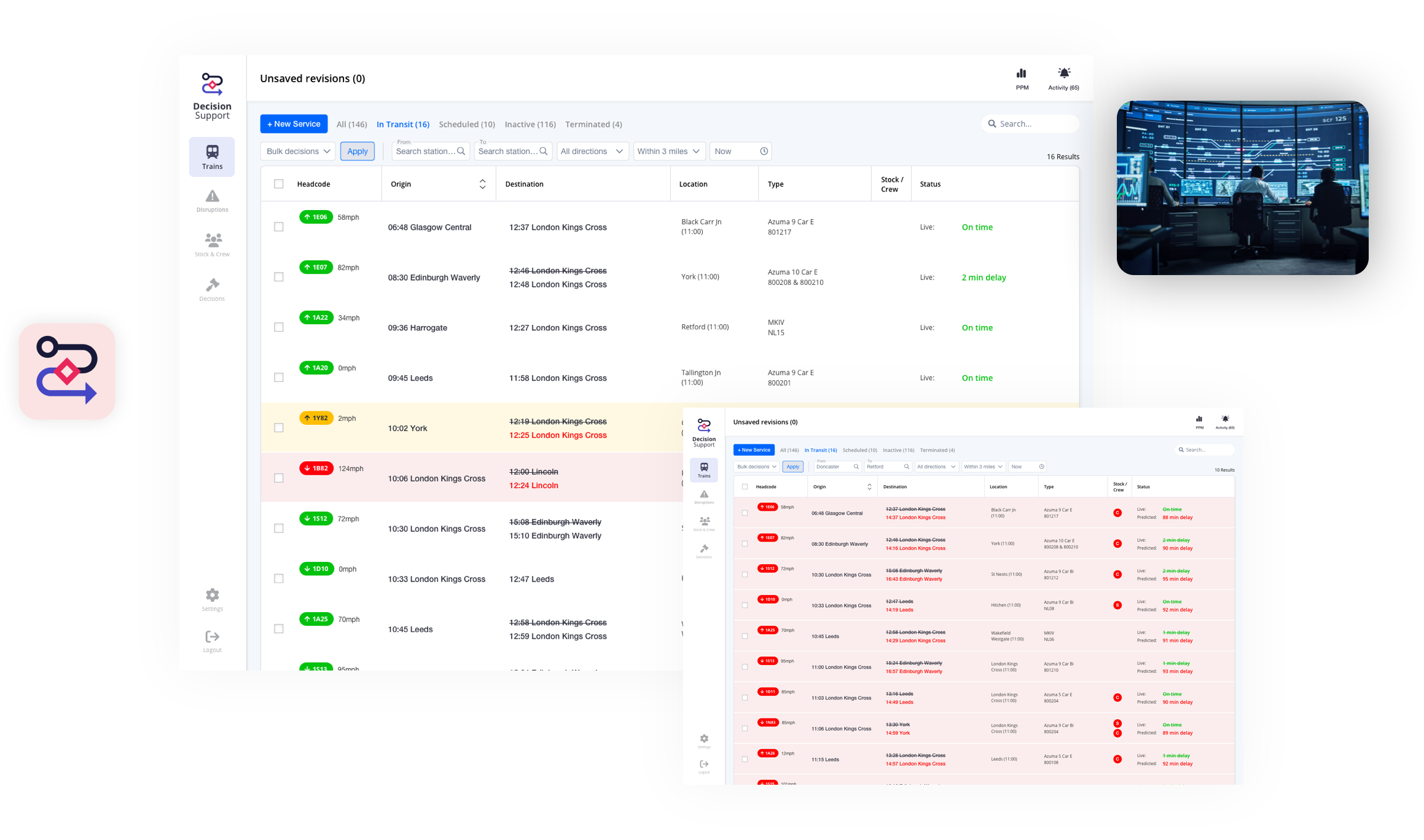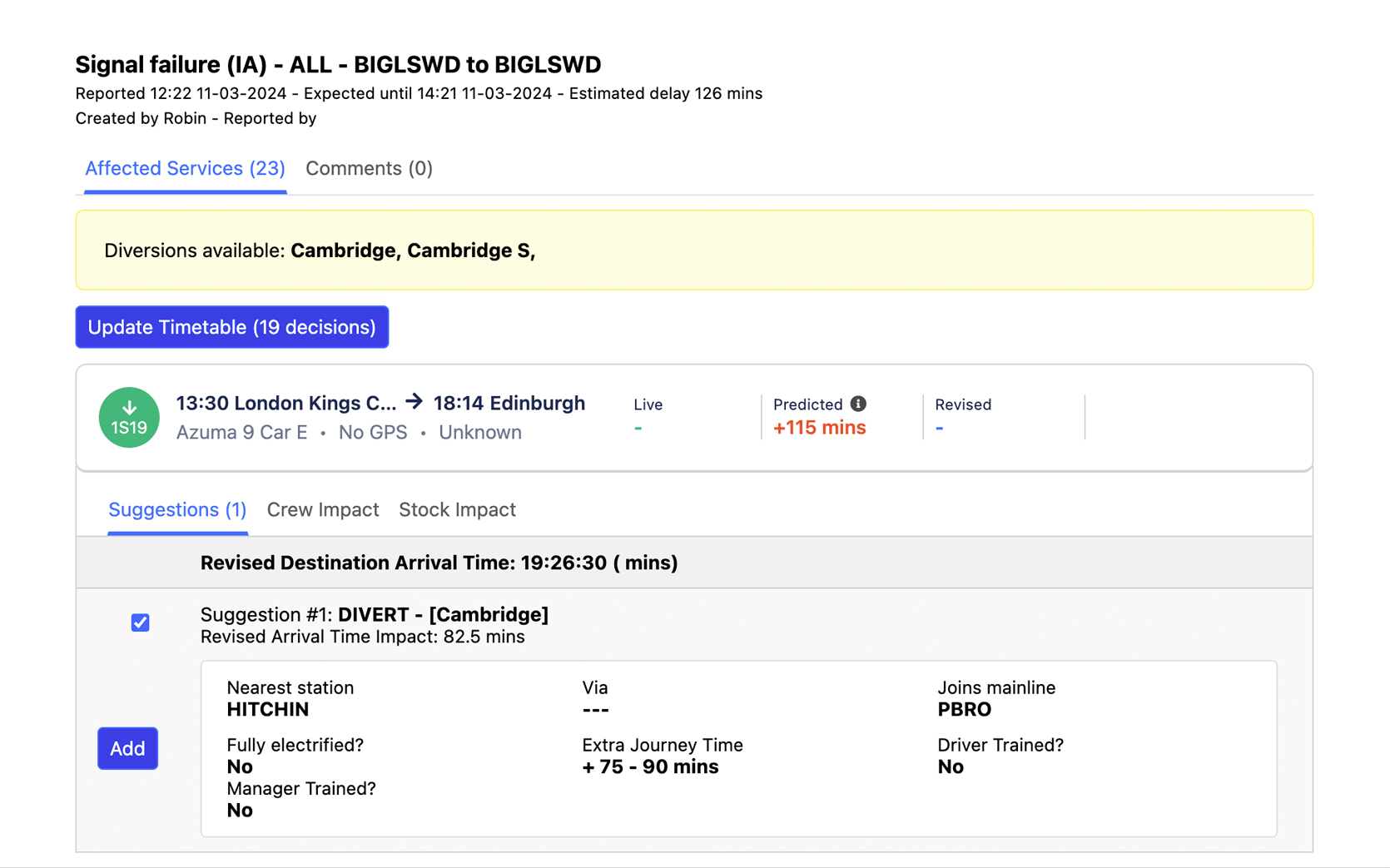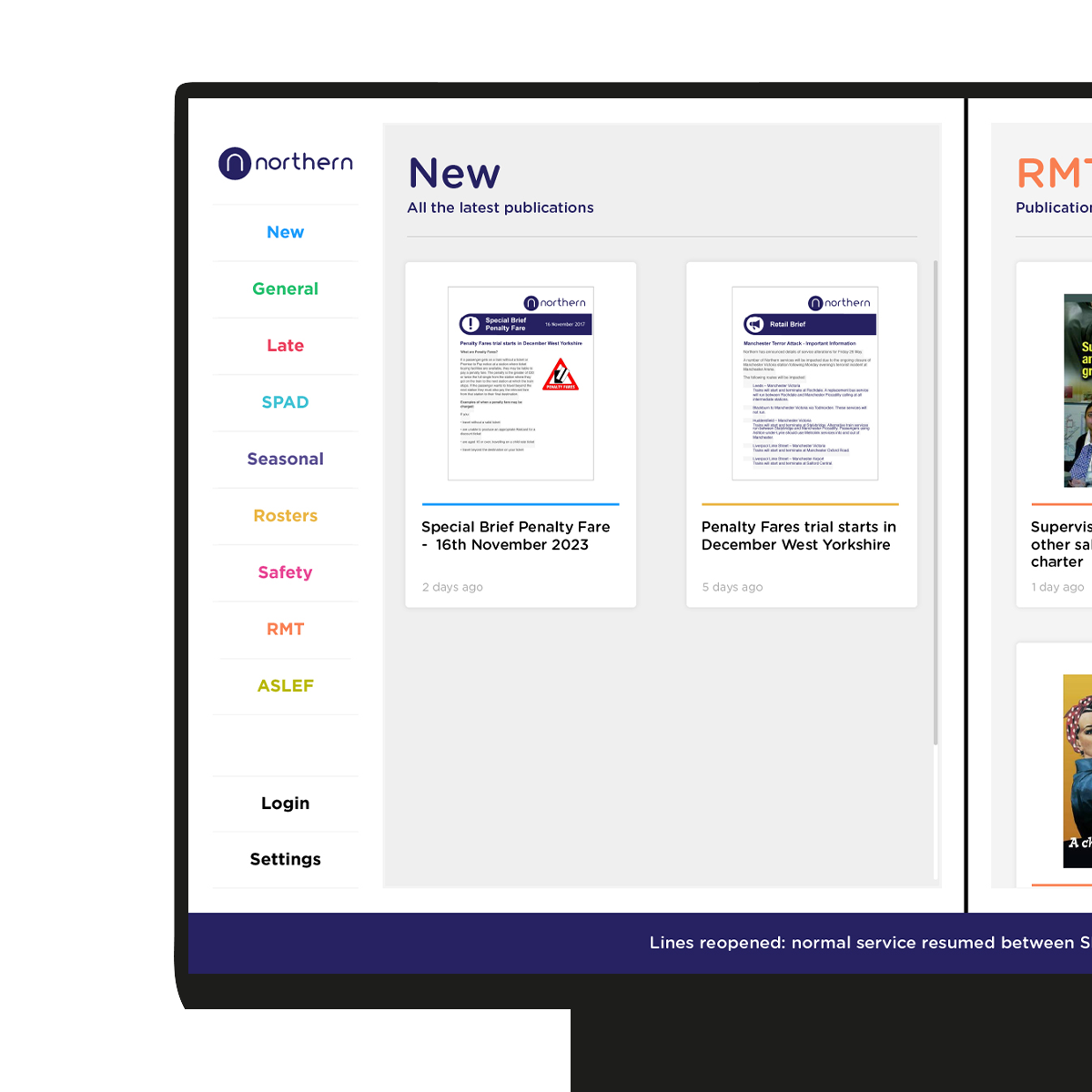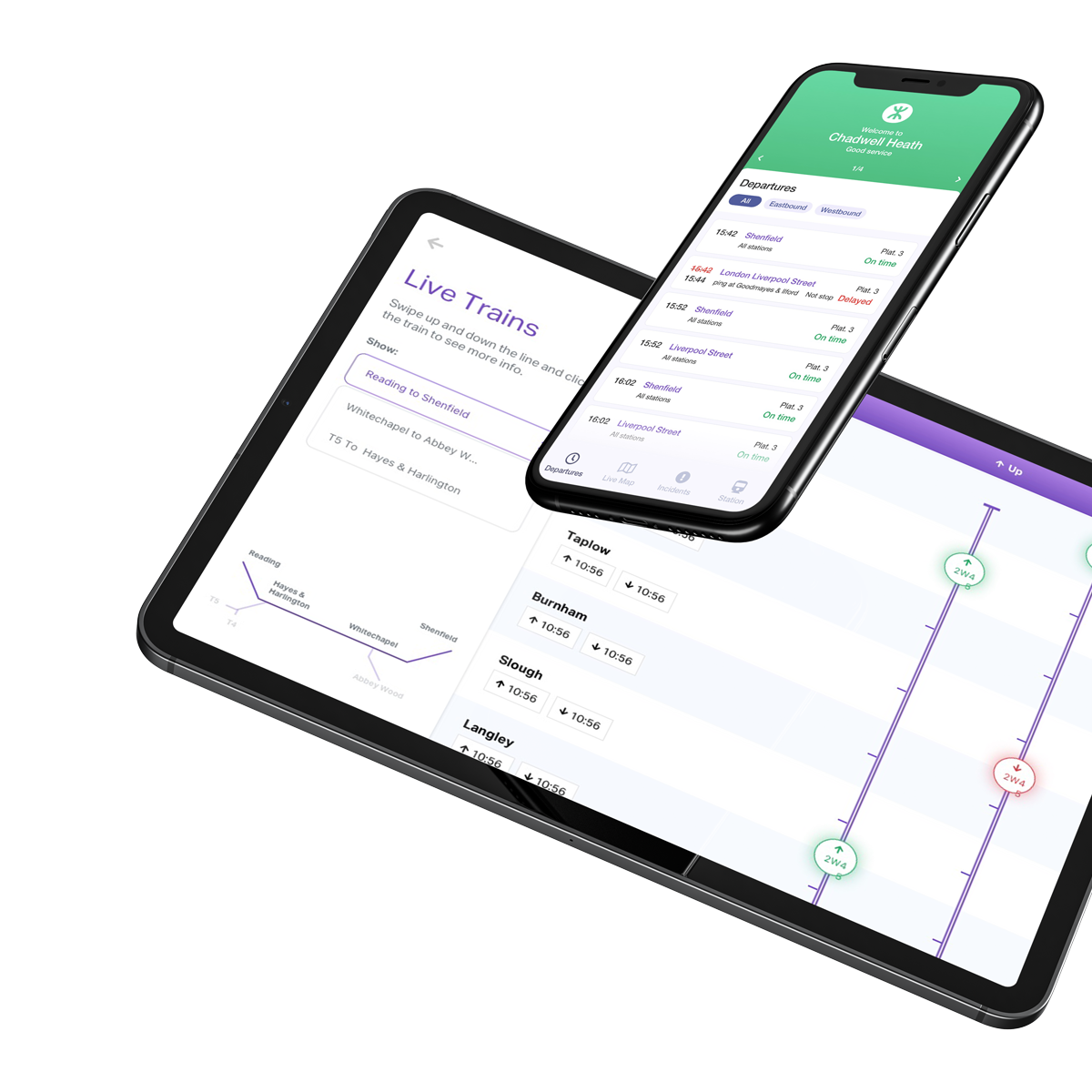- Products
- JNCTION Control
Reduce delays and improve network performance
- JNCTION Frontline
Deliver real-time station information to passengers
- JNCTION Notice Board
Streamlining communication and enhancing efficiency
- JNCTION Analyse
Analyse train movements and timetable planning rules
- JNCTION LiveData
Real-time train movement data engine
- JNCTION Archive
Download historic train movements data for use in software or analysis
- Services
- Products
- JNCTION Control
-
Controller alerts
-
Live trains
-
Diversion engine
-
Incidents and decisions
-
Live map
-
Customer Experience Information
-
Stock
-
Crew
Improve disruption management
Enhancing railway control room efficiency to reduce delays across the railway network

Railway control room challenges
Running a railway network can be challenging in several different ways. Operators need information from several different sources, using multiple systems, leading to tasks being duplicated, and time wasted. Railway networks by their nature are complex, and can cover large geographical area, making it difficult to know what is happening everywhere at once. Without easy quick access to all the information needed, decisions can take time to make, which leads to further delays to the train services.
The tool addresses these challenges by:
Streamlining Data
Consolidating all data sources into one easy to use UI, saving users time when looking up information and making decisions.
Enhanced Regulation
Providing predictive clash/conflict alerts for train services that will potentially be delaying each other – leading to better regulation decisions.
Early Warning System
Real-time alerts, based on GPS and train movement data, that give controllers early warning signs of trains that have become delayed – leading to quicker decisions.
Optimising Operations
Utilise domain knowledge to quickly assess diversion feasibility and efficiently adjust timetables during disruptions with a live map.
Proactive Management
Predictive stock and crew alerts for when diagrams are possibly going to be breached
Features
Controllers may not be aware of all problems occurring over the large network they are monitoring.
Clash/conflict predictions
These alerts tell a controller when 2 or more trains will be arriving at the same location within a specified time window, giving the user an early warning as to when trains may become delayed by other trains, maximising the opportunity to take regulation action, which leads to reducing delays for passengers and minimising costs for train operators.

Service alerts
These alerts tell the controller when services are running late, have breached their sectional running time or have breached the timetabled dwell time at a booked calling stop, giving the user an early warning as to what trains are delayed and where.


Stock and crew alerts
These alerts are based on the stock and crew diagrams that are integrated into the system and tell the user when a unit or crew member will possibly breach their turnaround time, which would cause a delay to the next working service.
GPS Alerts
GPS alerts are based on the geofenced stations and tiplocs of a TOCs route and will alert the user when a train has stopped in a location it was not expected to.
The live trains module allows controllers to access all the information they need in one place, without having to look up information in multiple different systems.
Live train movement data can be viewed in real-time, alongside data imported from multiple different systems, such as GPS information, crew and stock diagrams, allocations and loading/weigh data.

The diversion engine module provides replanning suggestions when a line block incident occurs on the network.
It uses custom configured databases and rules to automatically suggest diversionary routes that might be available, considers track capabilities, stock type, crew skills, and compares the predicted running times of using the diversion versus waiting for the incident to be over. This greatly improves the time it takes to calculate if a diversion is possible and worthwhile, leading to quicker decisions and less delayed trains.

As part of the live trains’ module, users are given a sandbox environment to test train service decisions, log incidents and record decisions.
The incident management module gives users and easy to use wizard for recording incidents as they occur, providing the user with a list of affected trains, and a predicted incident delay time, based on the incident parameters. Incidents can also be imported in real-time from external incident logging systems via an API.
This works alongside the decision management module allows users to test and record decisions before carrying them out. Users can change calling patterns, divert services to different locations and cancel services, and mark them for approval by other stakeholders in the decision-making process.
The Live Map module gives controllers an entire view of the railway network they are responsible for monitoring.
Users can search by station or headcode or click and drag their way around an easy-to-use graphical representation of the specified routes. All trains from all TOCs are shown, and users can view which diversion routes are also available to use.
Customer Experience Information Module
Decisions created within the system can be exported in a number of different formats in order to feed customer information channels, social media accounts, content management systems, Darwin and other standard industry systems.
Real-time sandbox allocation module for managing rolling stock.
Currently under development: JNCTION are working on a module to manage real-time rolling stock allocations to allow users to test decisions in re-allocations and analyse the impact in real-time during disruption.
Real-time sandbox allocation module for managing crew.
Currently under development: JNCTION are working on a module to manage real-time crew allocations to allow users to test decisions in re- allocations and analyse the impact in real-time during disruption
Benefits
Increased train performance
Reduction in train delays, leading to reduced associated train operating company costs
Cost Savings
Reduced operational costs, control staff can be more efficient using DST (quicker and better decisions), less new staff needed, and reduced training costs Reduced fuel costs resulting from reduced delay
Improved Passenger Satisfaction
Reduced train delays lead to better results in customer satisfaction surveys, resulting in increased revenue from increased usage of the railway
Environmental Impact
Reduction in carbon emissions and energy usage resulting from reduced train delays and optimised train routing
Bespoke Rail Solutions
We understand that one size doesn’t fit all when it comes to rail. That’s why we offer bespoke services and customisable modules which can be mix-and-matched to ensure that your rail solutions perfectly align with your unique requirements.
We pride ourselves on our flexibility and agility, seamlessly integrating custom solutions into your project timeline and budget.
Whether you’re looking to enhance safety, improve efficiency, or optimise performance, we ensure that your railway system is tailored to meet your exact requirements.
For a consultation or a product demo, please get in touch.
Or alternatively, call us on 0203 011 1008
 We use cookies on our website to give you the most relevant experience by remembering your preferences and repeat visits. By clicking “Accept”, you consent to the use of ALL the cookies.Manage consent
We use cookies on our website to give you the most relevant experience by remembering your preferences and repeat visits. By clicking “Accept”, you consent to the use of ALL the cookies.Manage consentPrivacy Overview
This website uses cookies to improve your experience while you navigate through the website. Out of these, the cookies that are categorized as necessary are stored on your browser as they are essential for the working of basic functionalities of the website. We also use third-party cookies that help us analyze and understand how you use this website. These cookies will be stored in your browser only with your consent. You also have the option to opt-out of these cookies. But opting out of some of these cookies may affect your browsing experience.Necessary cookies are absolutely essential for the website to function properly. These cookies ensure basic functionalities and security features of the website, anonymously.Cookie Duration Description cookielawinfo-checbox-analytics 11 months This cookie is set by GDPR Cookie Consent plugin. The cookie is used to store the user consent for the cookies in the category "Analytics". cookielawinfo-checbox-functional 11 months The cookie is set by GDPR cookie consent to record the user consent for the cookies in the category "Functional". cookielawinfo-checbox-others 11 months This cookie is set by GDPR Cookie Consent plugin. The cookie is used to store the user consent for the cookies in the category "Other. cookielawinfo-checkbox-necessary 11 months This cookie is set by GDPR Cookie Consent plugin. The cookies is used to store the user consent for the cookies in the category "Necessary". cookielawinfo-checkbox-performance 11 months This cookie is set by GDPR Cookie Consent plugin. The cookie is used to store the user consent for the cookies in the category "Performance". viewed_cookie_policy 11 months The cookie is set by the GDPR Cookie Consent plugin and is used to store whether or not user has consented to the use of cookies. It does not store any personal data. Functional cookies help to perform certain functionalities like sharing the content of the website on social media platforms, collect feedbacks, and other third-party features.Performance cookies are used to understand and analyze the key performance indexes of the website which helps in delivering a better user experience for the visitors.Analytical cookies are used to understand how visitors interact with the website. These cookies help provide information on metrics the number of visitors, bounce rate, traffic source, etc.Advertisement cookies are used to provide visitors with relevant ads and marketing campaigns. These cookies track visitors across websites and collect information to provide customized ads.Other uncategorized cookies are those that are being analyzed and have not been classified into a category as yet. - JNCTION Control

